2015-2016学年外研版初中英语八年级下册Module 9 Friendship 单元测试题
- 格式:doc
- 大小:191.37 KB
- 文档页数:10
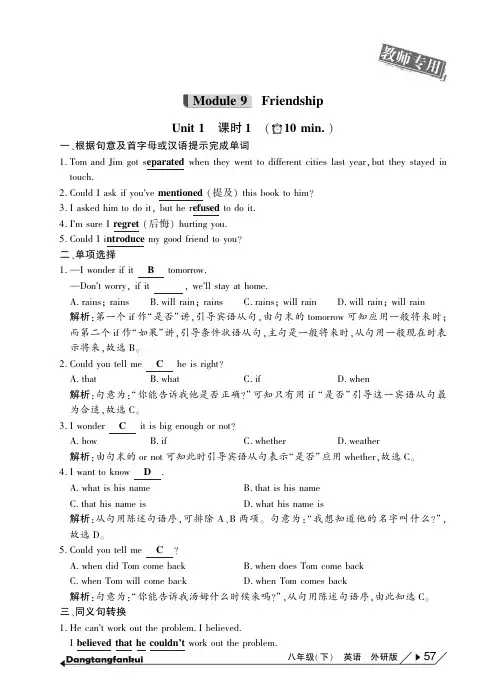
八年级(下) 英语 外研版57 Module 9 FriendshipUnit 1 课时1 (10min.)一㊁根据句意及首字母或汉语提示完成单词1.Tom and Jim got s eparated when they went to different cities last year,but they stayed intouch.2.Could I ask if you’ve mentioned (提及)this book to him?3.I asked him to do it,but he r efused to do it.4.I’m sure I regret (后悔)hurting you.5.Could I i ntroduce my good friend to you?二㊁单项选择1. I wonder if it B tomorrow. Don’t worry,if it ,we’ll stay at home.A.rains;rains B.will rain;rains C.rains;will rain D.will rain;will rain解析:第一个if 作 是否”讲,引导宾语从句,由句末的tomorrow 可知应用一般将来时;而第二个if 作 如果”讲,引导条件状语从句,主句是一般将来时,从句用一般现在时表示将来,故选B㊂2.Could you tell me C he is right?A.that B.what C.if D.when 解析:句意为: 你能告诉我他是否正确?”可知只有用if 是否”引导这一宾语从句最为合适,故选C㊂3.I wonder C it is big enough or not?A.how B.if C.whether D.weather 解析:由句末的or not 可知此时引导宾语从句表示 是否”应用whether,故选C㊂4.I want to know D .A.what is his nameB.that is his nameC.that his name isD.what his name is 解析:从句用陈述句语序,可排除A㊁B 两项㊂句意为: 我想知道他的名字叫什么?”,故选D㊂5.Could you tell me C ?A.when did Tom come backB.when does Tom come backC.when Tom will come backD.when Tom comes back解析:句意为: 你能告诉我汤姆什么时候来吗?”,从句用陈述句语序,由此知选C㊂三㊁同义句转换1.He can’t work out the problem.I believed.I believed that he couldn’t work out the problem.八年级(下) 英语 外研版58 2.How can we get to the airport?I don’t know.I don’t know how we can get to the airport.3.Where did you find the book?Could you tell me?Could you tell me where you found the book?4.I don’t know why they are standing there.I don’t know what they are standing there for .5.Will you go there by bus?Have you made a decision?Have you decided if /whether you go there by bus?6.Was the 29th Olympic Games held in Beijing?Could you tell me?Could you tell me if /whether the 29th Olympic Games was held in Beijing?7.Mary asks me.Are you a teacher?Mary asks me if /whether I am a teacher.第一题5分,第二题10分,第三题14分,总计29分□未达标 □达标(17分) □优秀(23分)1 课时2 (10min.)一㊁单项选择1.Mr.King didn’t know D yesterday evening.A.when does his son come home B.when his son comes home C.when did his son come homeD.when his son came home 解析:宾语从句用陈述句语序,故可排除A㊁C 两项,又由yesterday 可知应用过去时态㊂故选D㊂2.I wonder B you would like to come to my birthday party.A.that B.whether C.that ifD.that whether 解析:句意为: 我想知道你是否愿意来参加我的生日聚会?”由此知选B㊂3.Do you know C during the coming holiday?A.what will Tom do B.what did Tom do C.what Tom will do D.what Tom did 解析:句意为: 你知道汤姆在即将到来的假期中做什么吗?”由此可知用一般将来时,故选C㊂4.China B more people English.A.encourage;learnB.has encouraged;to learnC.has encouraged;learning 解析:句意为: 中国支持更多的人学英语㊂”不定式表示具体的将要进行的动作,结合句意可知选B㊂5.(2013·湖北孝感)Students shouldn’t go to school B breakfast.It’s bad for theirhealth.A.with B.without C.forD.by八年级(下) 英语 外研版59 解析:考查介词的用法㊂句意为: 学生们不应当不吃早饭就去上学㊂这会对他们的身体有害的㊂”介词without 没有”,符合句意㊂二㊁用所给词的适当形式填空1.Could you explain (explain)what happened this morning?2.Could I ask if they’ve mentioned (mention)this car to you?3.Do you know why he treats (treat)you like that?4.I’m sure your parents regret hurting (hurt)you.5.I’ll encourage him to join (join)in the club.三㊁根据汉语意思完成句子1.你知道汤姆到了没有?Do you know if Tom has arrived ?2.我问过你的父母你是否可以来?I asked your parents whether you could come or not .3.我能问问你是否思念自己的家乡,或自己的亲人吗?Could I ask you if you miss your hometown,or your relations?4.最初李萍赶不上她的同学,但最后她赶上了㊂At first Li Ping couldn’t catch up with her classmates,but at last she did.5.我后悔当初接受了他的建议㊂I regret taking his advice at that time.第一题10分,第二题5分,第三题10分,总计25分□未达标 □达标(15分) □优秀(20分)Unit 2 课时1 (10min.)一㊁翻译短语1.一天天地day by day2.安静的;沉默的in silence3.回过头turn back4.在那时at that moment二㊁根据汉语提示完成句子1.No one knew who I was (我是谁).2.I was very lonely,and afraid to make friends (去交朋友)with anyone.3.Every time I heard the other students talking and laughing (说说笑笑),I felt very lonely.4.I asked him why he smiled,but he couldn’t remember smiling (微笑)at me!5.It doesn’t matter (没关系)because all the dark days have gone.三㊁单项选择1.The teacher told us that light Amuch faster than sound.A.travels B.traveled C.would travel D.had traveled 解析:光比声音传播速度快是真理性的,从句应该用一般现在时㊂故选A㊂2.Do you know if C back next week?If he back,please let me know.A.he comes;will comeB.will he come;comes八年级(下) 英语 外研版60 C.he will come;comes D.will he come;will come 解析:前一句是宾语从句,用陈述句语序,由next week 可知用一般将来时㊂后一句是if引导的条件状语从句,主句用一般将来时从句用一般现在时㊂故选C㊂3. B ,Zhang Bei became closer to everyone in her class.A.Day in day B.Day by day C.Day on dayD.Day with day 解析:句中day by day 表示 一天天地,逐日”,是固定搭配,符合句意㊂4.He was afraid A making friends with anyone.A.ofB.toC.inD.for 解析:be afraid of doing sth.意为 害怕做某事”,为固定用法㊂5.Mr.Brown C flowers at that moment.A.waters B.is watering C.was watering D.watered 解析:由at that moment 可知用过去进行时㊂故选C㊂四㊁按要求完成句子1.I believe that he can repair the bike.(改为否定句)I don’t believe that he can repair the bike.2.Jenny asked me.Where do you come from?(合并句子)Jenny asked me where I came from .3.Please pass him some salt.(改为同义句)Please pass some salt to him .4.I had a fever.(对画线部分提问)What’s the matter with you?5.My father always works all day and all night.We are all worried about his health.(改为同义句)My father always works all day and all night.Weall worry about his health.第一题4分,第二题5分,第三题10分,第四题10分,总计29分□未达标 □达标(17分) □优秀(23分)Unit 2 课时2 (10min.)一㊁根据句意及汉语提示完成单词1.The bright (明亮的,耀眼的)sun lit up the sky.2.I’m afraid (恐怕)she is ill in hospital.3.He is a lonely (孤独的)boy.4.Your suggestions (建议)are unworkable.5.Everybody likes him and trusts (相信)him.二㊁单项选择1.She learns more about her job A .A.day by day B.day to day C.one by day D.day after day 解析:day by day 一天天地”;day to day 天天”;one by day 无此说法;day after day 日复一日”㊂句意为: 一天天地她更加了解她的工作㊂”结合语境可知选A㊂八年级(下) 英语 外研版61 2.I don’t know D the day after tomorrow.A.when does he come B.how will he comeC.if he comesD.whether he’ll come 解析:句意为: 我不知道后天他是否会来”㊂宾语从句用陈述句语序㊂3.Could you tell me D the nearest hospital is?A.whatB.howC.whetherD.where 解析:where 表示地点,从句意为 最近的医院在哪里”㊂4.I want to know D .A.whom is she looking afterB.whom she is lookingC.whom is she lookingD.whom she is looking after 解析:宾语从句用陈述句语序,whom 在句中作宾语㊂5.Do you know where A now?A.he lives B.does he live C.he lived D.did he live 解析:主句用现在时态,,根据now 可知宾语从句用一般现在时,且用陈述句语序㊂三㊁按要求完成句子1.Does Mr.Brown enjoy living in China?Could you tell us?(改写句子)Could you tell us if /whether Mr.Brown enjoys living in China?2. Does the girl need any help?”he asked me.(改为含宾语从句的复合句)He asked me if /whether the girl needed some help.3.Jim is not a student.Tom is not a student,either.(合并为一个句子)Neither Jim nor Tom is a student.4.When does the train leave?I want to know.(改为含宾语从句的复合句)I want to know when the train leaves .5.They went home after they had finished their homework.(用not until 改写)They didn’t go home until they had finished their homework.6.Did Peter come here yesterday?Li Lei wants to know.(改为含宾语从句的复合句)Li Lei wants to know if /whether Petercame here yesterday.第一题5分,第二题10分,第三题12分,总计27分□未达标 □达标(16分) □优秀(22分)Unit 3 (10min.)一㊁单项选择1.Do you know what time D ?A.the train leaveB.does the train leaveC.will the train leaveD.the train leaves解析:宾语从句用陈述句语序,且陈述的是客观事实,故用一般现在时㊂2.I don’t know D .Can you tell me?A.how the two players are old B.how old are the two players八年级(下) 英语 外研版62 C.the two players are how old D.how old the two players are 解析:宾语从句用陈述句语序㊂3.The small children don’t know B .A.what is their stockings inB.what is in their stockingsC.where is their stockings inD.what in their stockings 解析:宾语从句用陈述句语序,what 在从句中作主语㊂4.I can’t understand D .A.what does Christmas mean B.what Christmas does mean C.what mean Christmas does D.what Christmas means解析:宾语从句用陈述句语序,what 在从句中作宾语㊂5.I don’t know C he will be back home.A.whoB.whatC.whenD.where 解析:因为后面的从句是说他将回家,所以前面应该是我不知道他什么时候回家㊂6.Could you tell me B ?A.where do you live B.who you are waiting for C.who were you waiting for D.where you live in 解析:B 是陈述句语序,D 可以用where you live 或which you live in㊂二㊁用所给词的适当形式填空1.I’ve heard (hear)that Arthur isn’t go to play the piano at the concert.2.Do you know what time he left (leave)for New York yesterday?3.I want to know whether my uncle will come (come)tomorrow or not.4.The teacher said the earth goes (go)around the sun.5.The man asked me who I was waiting (wait)for at that moment.三㊁用适当的介词或副词填空1.Do you think your friendship will stay the same in the future?2.It was too late and Marry went to school without lunch.3.Tom is twelve years old.You don’t need to worry about him.4.The boy smiled to me,but he said nothing.5.There is a little tree in my garden and it is growing up day by day.第一题12分,第二题5分,第三题5分,总计22分□未达标 □达标(13分) □优秀(18分)。
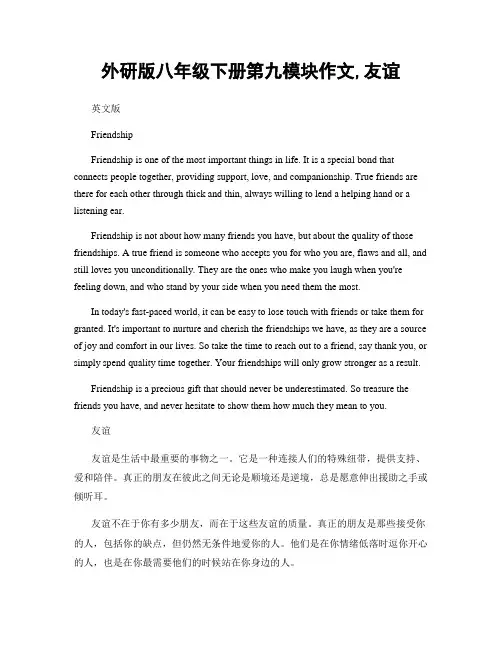
外研版八年级下册第九模块作文,友谊英文版FriendshipFriendship is one of the most important things in life. It is a special bond that connects people together, providing support, love, and companionship. True friends are there for each other through thick and thin, always willing to lend a helping hand or a listening ear.Friendship is not about how many friends you have, but about the quality of those friendships. A true friend is someone who accepts you for who you are, flaws and all, and still loves you unconditionally. They are the ones who make you laugh when you're feeling down, and who stand by your side when you need them the most.In today's fast-paced world, it can be easy to lose touch with friends or take them for granted. It's important to nurture and cherish the friendships we have, as they are a source of joy and comfort in our lives. So take the time to reach out to a friend, say thank you, or simply spend quality time together. Your friendships will only grow stronger as a result.Friendship is a precious gift that should never be underestimated. So treasure the friends you have, and never hesitate to show them how much they mean to you.友谊友谊是生活中最重要的事物之一。
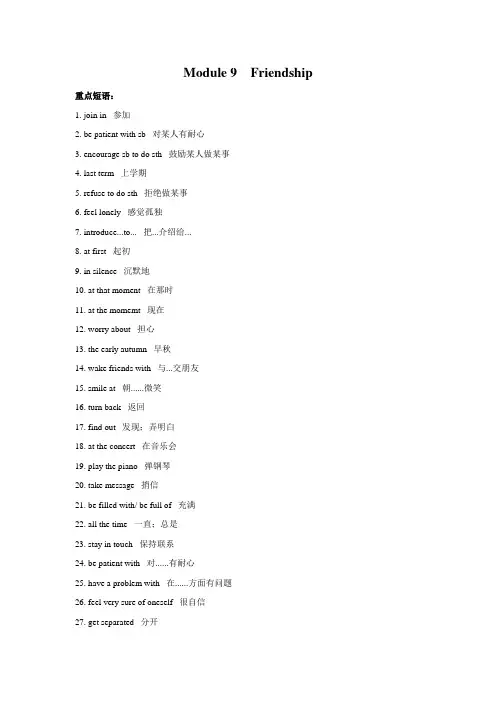
Module 9 Friendship 重点短语:1. join in 参加2. be patient with sb 对某人有耐心3. encourage sb to do sth 鼓励某人做某事4. last term 上学期5. refuse to do sth 拒绝做某事6. feel lonely 感觉孤独7. introduce...to... 把...介绍给...8. at first 起初9. in silence 沉默地10. at that moment 在那时11. at the momemt 现在12. worry about 担心13. the early autumn 早秋14. wake friends with 与...交朋友15. smile at 朝......微笑16. turn back 返回17. find out 发现;弄明白18. at the concert 在音乐会19. play the piano 弹钢琴20. take message 捎信21. be filled with/ be full of 充满22. all the time 一直;总是23. stay in touch 保持联系24. be patient with 对......有耐心25. have a problem with 在......方面有问题26. feel very sure of oneself 很自信27. get separated 分开28. day and day 一天天地29. circle of friends 朋友圈语法总结:1.Who is calling? –This is Lingling speaking.打电话回答用this is/ that is...2.I have a problem with my best friend. 我和好朋友有问题。
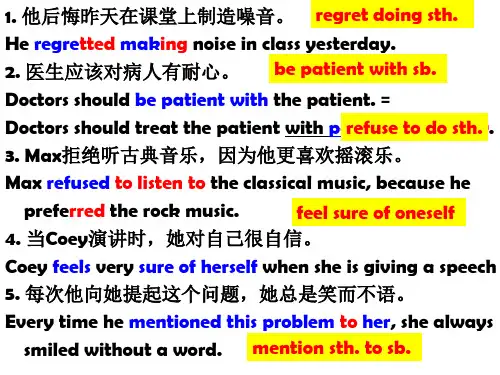
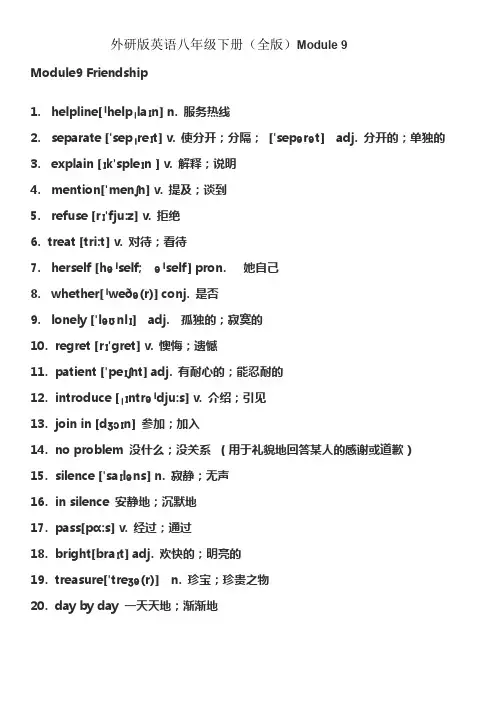
Module9 Friendship1. helpline[ˈhelpˌlaɪn] n. 服务热线2. separate ['sepˌreɪt] v. 使分开;分隔;['sepərət] adj. 分开的;单独的3. explain [ɪk'spleɪn ] v. 解释;说明4. mention['menʃn] v. 提及;谈到5. refuse [rɪ'fju:z] v. 拒绝6. treat [tri:t] v. 对待;看待7. herself [həˈself; əˈself] pron. 她自己8. whether[ˈweðə(r)] conj. 是否9. lonely ['ləʊnlɪ] adj. 孤独的;寂寞的10. regret [rɪ'ɡret] v. 懊悔;遗憾11. patient ['peɪʃnt] adj. 有耐心的;能忍耐的12. introduce [ˌɪntrəˈdju:s] v. 介绍;引见13. join in [dʒɔɪn] 参加;加入14. no problem 没什么;没关系(用于礼貌地回答某人的感谢或道歉)15. silence ['saɪləns] n. 寂静;无声16. in silence 安静地;沉默地17. pass[pɑ:s] v. 经过;通过18. bright[braɪt] adj. 欢快的;明亮的19. treasure['treʒə(r)] n. 珍宝;珍贵之物20. day by day 一天天地;渐渐地21. trust [trʌst] v.信任;信赖;n. 信任; 信赖22. include [ɪnˈklu:d] v. 包括;把……列为一部分23. circle ['sɜ:kl] n.(熟悉的,由相关的人形成的)圈子24. stick [stɪk] v. (stuck [stʌk]; stuck ) 粘;粘贴25. glue [ɡlu:] n. 胶水26. suggestion [səˈdʒestʃən] n. 提议;建议。
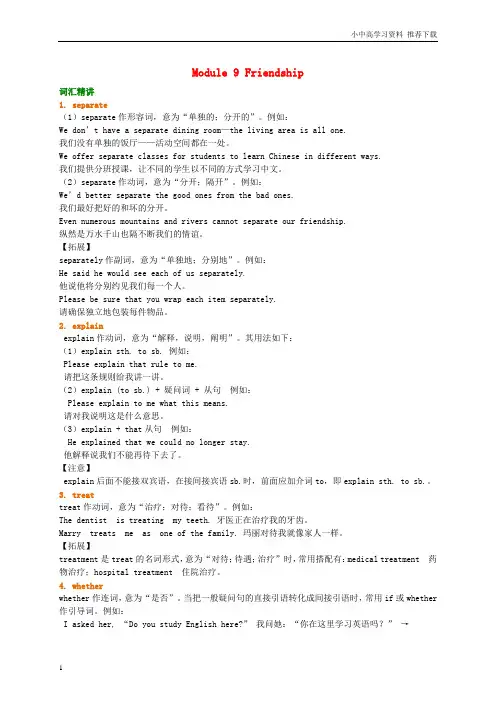
Module 9 Friendship词汇精讲1. separate(1)separate作形容词,意为“单独的;分开的”。
例如:We don’t have a separate dining room—the living area is all one.我们没有单独的饭厅——活动空间都在一处。
We offer separate classes for students to learn Chinese in different ways.我们提供分班授课,让不同的学生以不同的方式学习中文。
(2)separate作动词,意为“分开;隔开”。
例如:We’d better separate the good ones from the bad ones.我们最好把好的和坏的分开。
Even numerous mountains and rivers cannot separate our friendship.纵然是万水千山也隔不断我们的情谊。
【拓展】separately作副词,意为“单独地;分别地”。
例如:He said he would see each of us separately.他说他将分别约见我们每一个人。
Please be sure that you wrap each item separately.请确保独立地包装每件物品。
2. explainexplain作动词,意为“解释,说明,阐明”。
其用法如下:(1)explain sth. to sb. 例如:Please explain that rule to me.请把这条规则给我讲一讲。
(2)explain (to sb.) + 疑问词 + 从句例如:Please explain to me what this means.请对我说明这是什么意思。
(3)explain + that从句例如:He explained that we could no longer stay.他解释说我们不能再待下去了。
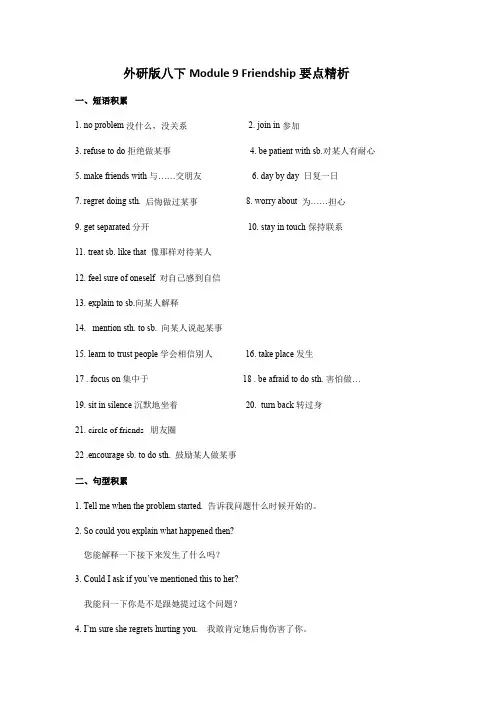
外研版八下Module 9 Friendship要点精析一、短语积累1. no problem没什么,没关系2. join in参加3. refuse to do拒绝做某事4. be patient with sb.对某人有耐心5. make friends with与……交朋友6. day by day 日复一日7. regret doing sth. 后悔做过某事8. worry about 为……担心9.get separated分开10. stay in touch保持联系11.treat sb.like that 像那样对待某人12. feel sure of oneself 对自己感到自信13.explain to sb.向某人解释14.mention sth.to sb. 向某人说起某事15. learn to trust people学会相信别人16.take place发生17. focus on集中于18.be afraid to do sth.害怕做…19.sit in silence沉默地坐着20.turn back转过身21. circle of friends 朋友圈22.encourage sb.to do sth. 鼓励某人做某事二、句型积累1. Tell me when the problem started. 告诉我问题什么时候开始的。
2. So could you explain what happened then?您能解释一下接下来发生了什么吗?3. Could I ask if you’ve mentioned this to her?我能问一下你是不是跟她提过这个问题?4. I’m sure she regrets hurting you. 我敢肯定她后悔伤害了你。
5. Many people make friends by writing letters. 许多人通过写信来交朋友。
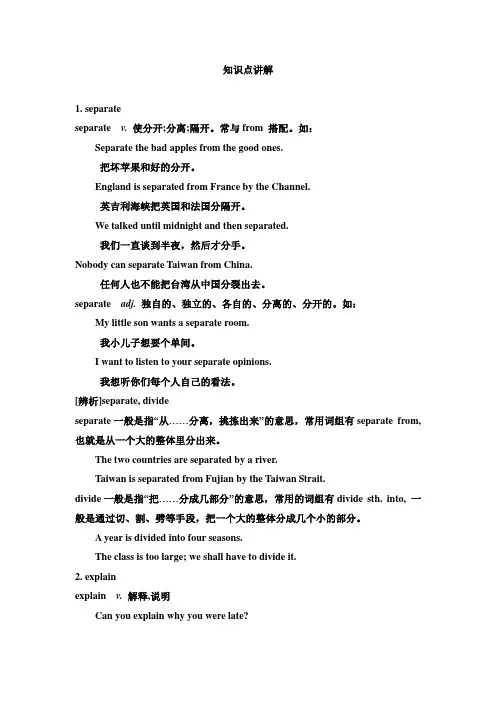
知识点讲解1. separateseparate v.使分开;分离;隔开。
常与from 搭配。
如:Separate the bad apples from the good ones.把坏苹果和好的分开。
England is separated from France by the Channel.英吉利海峡把英国和法国分隔开。
We talked until midnight and then separated.我们一直谈到半夜,然后才分手。
Nobody can separate Taiwan from China.任何人也不能把台湾从中国分裂出去。
separate adj.独自的、独立的、各自的、分离的、分开的。
如:My little son wants a separate room.我小儿子想要个单间。
I want to listen to your separate opinions.我想听你们每个人自己的看法。
[辨析]separate, divideseparate一般是指“从……分离,挑拣出来”的意思,常用词组有separate from, 也就是从一个大的整体里分出来。
The two countries are separated by a river.Taiwan is separated from Fujian by the Taiwan Strait.divide一般是指“把……分成几部分”的意思,常用的词组有divide sth. into, 一般是通过切、割、劈等手段,把一个大的整体分成几个小的部分。
A year is divided into four seasons.The class is too large; we shall have to divide it.2. explainexplain v.解释,说明Can you explain why you were late?你能解释一下你为什么迟到吗?He explained his plan in detail.他仔细地说明了自己的计划。
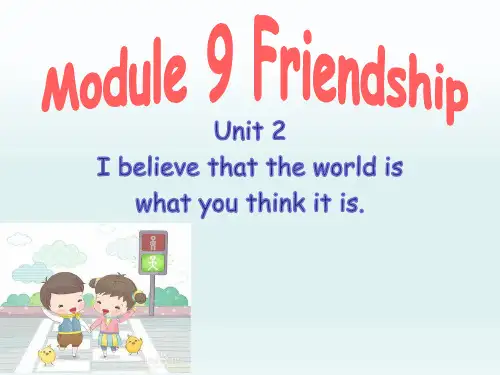
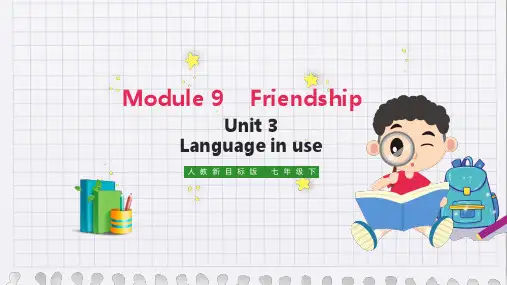
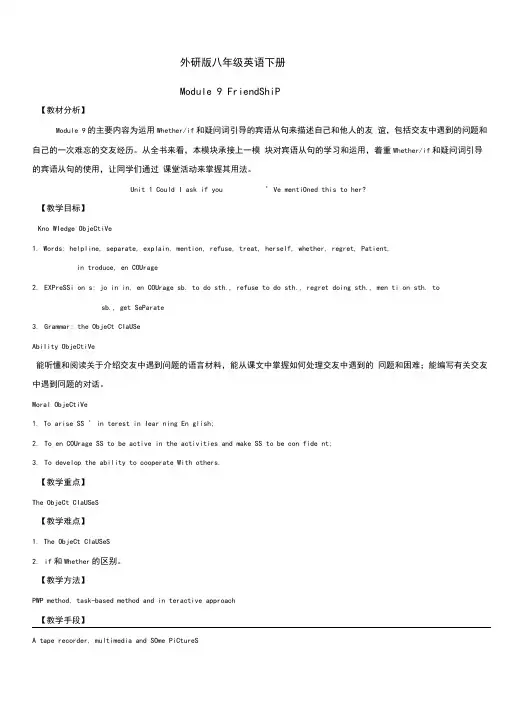
外研版八年级英语下册Module 9 FriendShiP【教材分析】Module 9的主要内容为运用Whether/if和疑问词引导的宾语从句来描述自己和他人的友谊,包括交友中遇到的问题和自己的一次难忘的交友经历。
从全书来看,本模块承接上一模块对宾语从句的学习和运用,着重Whether/if和疑问词引导的宾语从句的使用,让同学们通过课堂活动来掌握其用法。
Unit 1 Could I ask if you ' Ve mentiOned this to her?【教学目标】Kno WIedge ObjeCtiVe1.Words: helpline, separate, explain, mention, refuse, treat, herself, whether, regret, Patient,in troduce, en COUrage2.EXPreSSi on s: jo in in, en COUrage sb. to do sth., refuse to do sth., regret doing sth., men ti on sth. tosb., get SeParate3.Grammar: the ObjeCt CIaUSeAbiIity ObjeCtiVe能听懂和阅读关于介绍交友中遇到问题的语言材料,能从课文中掌握如何处理交友中遇到的冋题和困难;能编写有关交友中遇到冋题的对话。
Moral ObjeCtiVe1.To arise SS ' in terest in Iear ning En glish;2.To en COUrage SS to be active in the activities and make SS to be con fide nt;3.To develop the ability to cooperate With others.【教学重点】The ObjeCt CIaUSeS【教学难点】1.The ObjeCt CIaUSeS2.if和Whether的区别。
2015-2016学年外研版初中英语八年级下册Module 9 Friendship 单元测试题Ⅰ. 词汇(共10分,每小题1分)A) 根据句意及所给汉语提示写出句中所缺单词。
1. Just now my maths teacher e________ that problem to me. I know it now.2. Tim likes communicating with others, and he has a wide c________ of friends.3. We got s________ when Sam went to another city five years ago.4. Could you give me some g________? I want to stick my Chinese books.5. He’s an old friend of mine. I t________ him.B) 根据句意从方框中选出恰当的单词填空,有的需要变换形式,每个单词限用一次。
6. Sunglasses are useful to people when the sunlight is ________.7. Sandy is twenty years old but her parents always ________ her as a child.8. Tom ________ the park and went home last night.9. The form ________ many things. We can’t finish it in f ive minutes.10. The scientists have found ________ at the bottom of the sea.Ⅱ. 单项选择(共15分,每小题1分)从各题后所给的四个选项中选择可以填入空白处的最佳答案。
( )11. My brother left the room without ________ word just now.A. aB. anC. theD. 不填( )12. The girl ________ a big smile on her face is my best friend.A. onB. withC. forD. at( )13. Lisa feels sure of ________. She thinks she can feed the birds well.A. hisB. hersC. himselfD. herself( )14. Yesterday Mr Wang gave me some ________ about learning English well.A. suggestionsB. changesC. prizesD. decisions( )15. The old woman often feels ________ because her children live far away.A. sleepyB. crazyC. nervousD. lonely( )16. Mark ________ me to an American girl at the party. We became friends soon.A. acceptedB. choseC. introducedD. invited( )17. Ann refused ________ with her friends because she had to do her homework.A. playB. playingC. to playD. played( )18. Dad is weak after a long illness. The doctor encourages him ________ more sports.A. doingB. doneC. doD. to do( )19. Bob regretted ________ that information to Ira. As a result, Bob’s team lost to Ira’s team.A. offerB. offeringC. to offerD. offered( )20. Paul asks ________ we will go to the cinema with him or not.A. thatB. whetherC. whenD. why( )21. —Where is Mary?—She has been away for half an hour. I don’t know ________ she is now.A. whereB. whoC. whatD. how( )22. Our English teacher is very popular with us because she ________ us.A. is patient withB. is worried aboutC. is proud ofD. is angry with( )23. —Have you ________?—Yes, I have. And he likes it.A. mention the idea himB. mention the idea to himC. mentioned the idea himD. mentioned the idea to him( )24. —I hear that Zhang Jie will come to Tianjin to give a concert. Do you know ________?—Next week.A. when he will comeB. when did he comeC. when will he comeD. when he came( )25. —Hello. ________—Hello. This is Linda speaking.A. I’m looking for Linda.B. I’ll call back later.C. Who’s calling, please?D. Are you Linda?Ⅲ. 完形填空(共10分,每小题1分)先通读下面的短文,掌握其大意,然后从A、B、C、D四个选项中选择可以填入空白处的最佳答案。
We often see groups of students. We call the groups cliques (小圈子). These students do almost 26 together: having lunch, doing homework, playing sports, and going to the cinema.We all need friends. They help us with lessons. They help us out when we have some 27 . They listen to us when we complain (抱怨) about something 28 .However, not everything goes well or is always 29 . If your close friend, Omar, quarrels (争吵) with another friend, Max, what will you do? Omar 30 talking to Max, and that’s not all. He also wants you to stop talking to him, 31 Max and you have been friends for two years. What should you do?The best 32 is to tell Omar that you do not want to be in the quarrel. 33 him that this quarrel is not between you and Max. Tell him that you want to be friends with 34 of them. If he thinks you are still his good friend, hewill 35 your feelings. Then, you should also try to help them talk with each other again!( )26. A. nothing B. everything C. something D. anything( )27. A. problems B. results C. activities D. chances( )28. A. unhappy B. boring C. happy D. interesting( )29. A. important B. terrible C. strange D. perfect( )30. A. starts B. forgets C. remembers D. stops( )31. A. but B. and C. if D. because( )32. A. way B. time C. place D. age( )33. A. Ask B. Tell C. Send D. Expect( )34. A. all B. both C. none D. neither( )35. A. hide B. describe C. understand D. showⅣ. 情景交际(共10分,每小题2分)根据下面的对话情景,在每个空白处填上一个适当的句子,使对话的意思连贯、完整。
A: E xcuse me. I’m a reporter from Tianjin TV. (36)________________?B: Sure.A: (37)________________?B: I’m in Grade Eight.A: (38)________________?B: I like sending emails to my pen pals in different countries in my spare time.A: (39)________________?B: Yes, the emails are in English. I think they can improve my English.A: That sounds interesting. What are the other advantages?B: They can also help me learn a lot about my pen pals’ countries and their cultures. A: Ha ha ... (40)________________.B: You’re welcome.Ⅴ. 阅读理解(共20分,每小题2分)AIt was the first day of third grade. Samuel sat in the classroom and he already knew most of the students in his class.In the back of the classroom was a face that Samuel didn’t know. There sat a boy with dark hair and glasses.Mr Dale called the students by their names. “Ho Ming?” said Mr Dale. The boy in the back put up his hand.Ho Ming was from China. His family moved to the United States during the summer. Ho Ming seemed shy.Samuel tried to talk to Ho Ming, but he only smiled. Finally, Samuel understood the problem. This country was new to Ho Ming. Maybe the language was new to him too.That night Samuel asked his mum for help. Together they looked up some Chinese words on the Internet. Mum helped Samuel pronounce the words over and over again.The next morning Samuel went to talk to Ho Ming. Then he stopped. He was afraid he would say something wrong. He was afraid he would sound silly. “This must be how Ho Ming feels,” he thought.“Hello,” he said, using the Chinese words he learned. “I am your friend.”Ho Ming looked surprised. He answered Samuel in Chinese. Samuel had no idea what Ho Ming was saying.“My English is not too good yet,” said Ho Ming.“Neither is my Chinese,” said Samuel.“I will teach you,” offer ed Ho Ming.“And I will teach you,” said Samuel.Samuel took a ball out of his bag. “Want to play?” he asked.Ho Ming only smiled. Sometimes words are not even necessary (必要的).根据材料内容选择最佳答案。